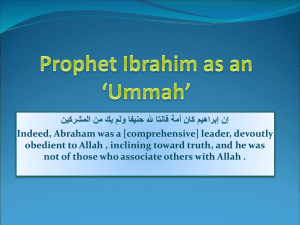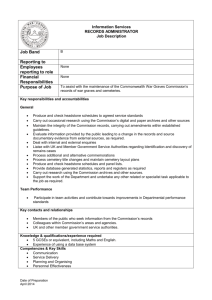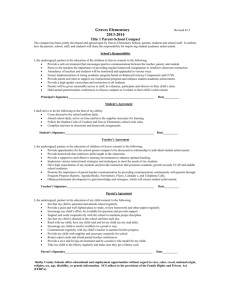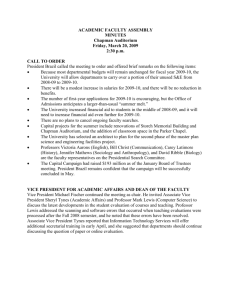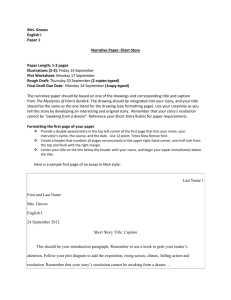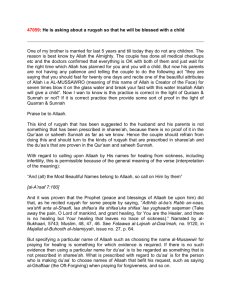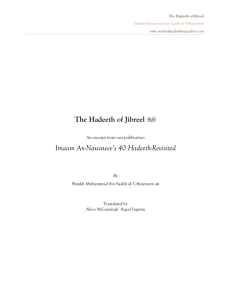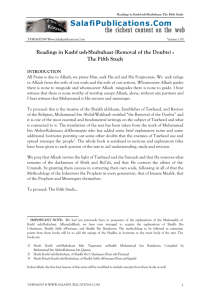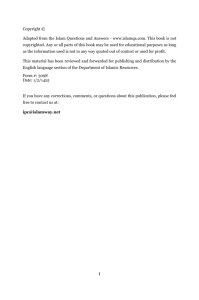Chapter 21 - SalafiTalk.Net
advertisement
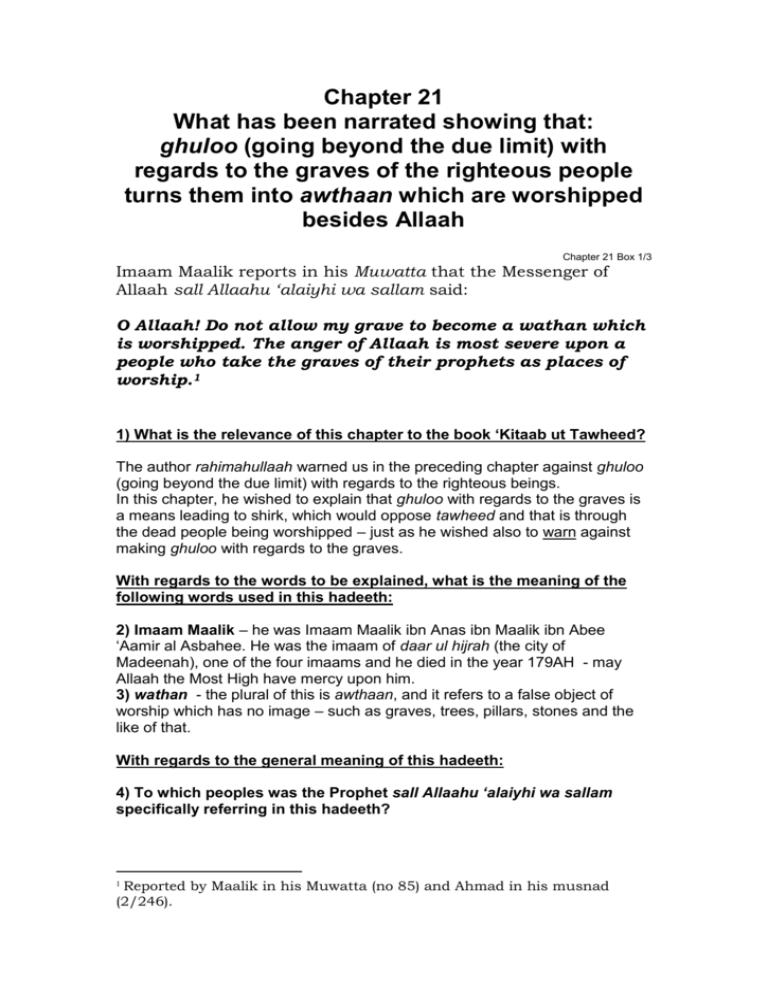
Chapter 21 What has been narrated showing that: ghuloo (going beyond the due limit) with regards to the graves of the righteous people turns them into awthaan which are worshipped besides Allaah Chapter 21 Box 1/3 Imaam Maalik reports in his Muwatta that the Messenger of Allaah sall Allaahu ‘alaiyhi wa sallam said: O Allaah! Do not allow my grave to become a wathan which is worshipped. The anger of Allaah is most severe upon a people who take the graves of their prophets as places of worship.1 1) What is the relevance of this chapter to the book ‘Kitaab ut Tawheed? The author rahimahullaah warned us in the preceding chapter against ghuloo (going beyond the due limit) with regards to the righteous beings. In this chapter, he wished to explain that ghuloo with regards to the graves is a means leading to shirk, which would oppose tawheed and that is through the dead people being worshipped – just as he wished also to warn against making ghuloo with regards to the graves. With regards to the words to be explained, what is the meaning of the following words used in this hadeeth: 2) Imaam Maalik – he was Imaam Maalik ibn Anas ibn Maalik ibn Abee ‘Aamir al Asbahee. He was the imaam of daar ul hijrah (the city of Madeenah), one of the four imaams and he died in the year 179AH - may Allaah the Most High have mercy upon him. 3) wathan - the plural of this is awthaan, and it refers to a false object of worship which has no image – such as graves, trees, pillars, stones and the like of that. With regards to the general meaning of this hadeeth: 4) To which peoples was the Prophet sall Allaahu ‘alaiyhi wa sallam specifically referring in this hadeeth? Reported by Maalik in his Muwatta (no 85) and Ahmad in his musnad (2/246). 1 He sall Allaahu ‘alaiyhi wa sallam was warning against falling into the ghuloo which the Jews and Christians had fallen into. 5) What error had these people fallen into? They had made ghuloo with regards to the graves of their prophets until these graves became awthaan (false objects of worship). 6) What was the reason why Allaah’s anger upon these people was so severe and for His curse being upon them? It was because of what they had done with regards to the graves of their prophets, such that they had made them into awthaan which were themselves worshipped, - this of course being shirk, which opposed tawheed. 7) What is the relevance of this hadeeth to the chapter? This hadeeth shows that making ghuloo (going beyond the due limit) with regards to the graves makes them into awthaan which are worshipped. This is because the Prophet sall Allaahu ‘alaiyhi wa sallam said: O Allaah! Do not allow my grave to become a wathan which is worshipped. And he explained this with his statement: … who take the graves of their prophets as places of worship. With regards to benefits of this hadeeth, fill in the missing words or phrases: This hadeeth shows: 8) That making ghuloo (going beyond the due limit) with regards to the graves of the prophets makes them into awthaan which are worshipped. 9) That taking the graves as places of worship is an act of ghuloo, and this leads to shirk. 10) An affirmation of ghadab (anger) for Allaah, the One free from all imperfections, in a manner that befits His Majesty. Chapter 21 Box 2/3 And from ibn Jareer who reports with his chain of narration from Sufyaan, from Mansoor from Mujaahid (with regards to the aayah): Have you considered al Laat and al ‘Uzzaa?2 He said: He (al Laat) used to grind the saweeq (mixture of wheat and barley) for them; then he died so they devoted themselves to his grave.3 And similarly Abu’l Jawzaa said from ibn ‘Abbaas : He used to grind the saweeq for the people performing hajj.4 With regards to the words to be explained, what is the meaning of the following words used in this narration: 1) ibn Jareer – he was the Imaam, the Haafidh (great memoriser) Muhammad ibn Jareer at Tabaree, the author of the Tafseer who died in the year 310AH – may Allaah have mercy upon him. 2) Sufyaan – what is most apparent is that this refers to Sufyaan ibn Saeed ath Thawree, the Imaam, the Proof (upon the creation), the one well known for his worship who died in the year 161AH – may Allaah have mercy upon him. 3) Mansoor - he was ibn Mu’tamir, trustworthy, the scholar of fiqh who died in the year 132AH - may Allaah have mercy upon him. 4) Mujaahid – he was Mujaahid ibn Jabr, trustworthy, the imaam in the field of tafseer who took from ibn ‘Abbaas and others. He died in the year 104 AH may Allaah have mercy upon him. 5) Abu’l Jawzaa – he was Aws ibn ‘Abdillaah ar Rab’ee, trustworthy and a well known person of knowledge who died in the year 83AH - may Allaah have mercy upon him. 6) he used to grind the saweeq - i.e. he would mix it with clarified butter and the like of that. 7) What is the relevance of this narration to the chapter? It shows that the basis for al Laat being worshipped was ghuloo with regards to his grave such that it became an idol which was worshipped. Soorah an Najm (53) aayah 19 Declared 'Saheeh' by Muhammad al-'Allaawee in his comments upon the narrations of 'Kitaab ut Tawheed' . 4 Saheeh ul Bukhaaree (no 4859) 2 3 Chapter 21 Box 3/3 And from ibn Abbaas radi Allaahu ‘anhumaa who said: The Messenger of Allaah sall Allaahu ‘alaiyhi wa sallam cursed the women who visit the graves and those people who take places of worship over them and put lamps there (to illuminate them). Reported by the Compilers of the Sunan.5 With regards to the words to be explained, what is the meaning of the following words used in this narration: 1) The Compilers of the Sunan – this refers to Aboo Daawud, and at Tirmidhee and ibn Maajah. And an Nasaa’ee did not report it. With regards to the general meaning of this narration: 2) What is the meaning of ‘curse’? It means being rejected and distanced from the mercy of Allaah. 3) What are some of the evil consequences that may arise from women visiting the graves? Their visiting may result in niyaaha (wailing), and jaza’ (expressing dissatisfaction) and the men being put to trial by them. 4) Why did the Messenger of Allaah sall Allaahu ‘alaiyhi wa sallam curse those people who take the burial grounds as places of worship or who illuminate these places with lamps and candlesticks? He did so because these are actions of ghuloo (going beyond the due limit) and which invite the people to commit shirk (with regards to the inhabitants of the graves). 5) What is the relevance of this narration to the chapter? This narration shows that it is forbidden to make ghuloo (going beyond the due limit) with regards to the graves because this will cause them to become idols which are worshipped. With regards to benefits of this narration, fill in the missing words or phrases: 5 Shaykh al Albaanee rahimahullaah grades this as da’eef (weak) with this wording – see his checking of at Tirmidhee (no 320), ibn Maajah (1575) and Aboo Daawud (3236). And Shaykh al Albaanee says about it in 'Da'eef Sunan it-Tirmidhee' “da’eef… and it is authentic with the wording 'those women who frequently visit the graves', and without 'the lamps'.” This narration shows: 6) The prohibition of ghuloo with regards to the graves by taking them as places of worship – because this will lead to shirk. 7) The prohibition of illuminating the graves because this is a means that leads to worshipping them. 8) That making ghuloo with regards to the graves is from the major sins. 9) That the reason for the prohibition of prayer at the graves is: the fear of falling into shirk. It is not for the reason of najaasah (impurity) because the Messenger sall Allaahu ‘alaiyhi wa sallam linked a) the taking of the graves as places of worship with b) lighting them with lamps and he cursed both of these practices. The curse upon lighting them with lamps is not for reasons of impurity – and the same is true for prayer at the graves.

